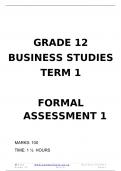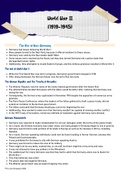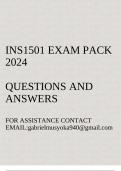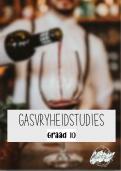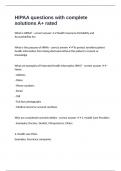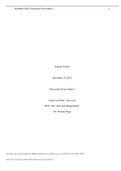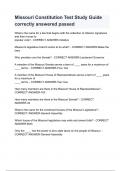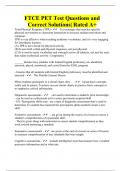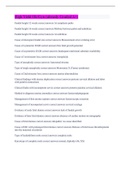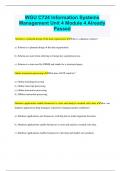Tutorial letter 201/2/2017
Colonial and Postcolonial African
Literatures
ENG2603
Semester 2
Department of English Studies
CONTENTS
1. Feedback: Assignment 01.
2. Examination Guidelines.
Define tomorrow
,Dear Student
SEMESTER 2: ASSIGNMENT 01
Nervous Conditions by Tsitsi Dangarembga
Your assignment question required you to discuss agency in the roles of Tambu’s mother,
her aunt Maiguru and the other married women in Nervous Conditions. You had to do this
in relation to African traditional and westernized lifestyles.
We appreciate that most of you kept in their minds the keywords agency, African traditional
lifestyles, westernized lifestyles and married women. Those who did so benefited from
good scores that rewarded their sustained balance in weaving the keywords into their
discussions in all paragraphs, as well as from resultant coherence in their discussions.
Your literature review in preparation for this assignment had to include article and book
chapters on feminism, because the word “agency” belongs to a paradigm consisting of
other words used in feminist discourse that you have to know. It is words like chauvinism,
paternalism, stereotype, subject, object, and others.
In order to do better, you all had to remember that although your assignment question
required you to discuss a specific category of characters in the novel, those characters
could not be explored in isolation from the other actors in the story. As far as the idea of
marriage is concerned, all married women in Nervous Conditions could not helpfully be
scrutinized without bringing in the brilliant characterization of Lucia. Although Lucia is
unmarried, her boisterous nature offers much as far as marriage within African cultures is
concerned. In her role throughout the novel, Lucia cohabits and tampers with African
traditional men who are in intriguing marital relations with their spouses. This will become
clear below, as we start highlighting incidents in the novel that are rich with the subject your
assignment answer had to look at.
Some key parts in the characterization of Nervous Conditions that you should have dwelt
on in your answer (as they are relevant to your assignment question) are:
As Babamukuru and Maiguru pack to go and spend five years studying for their
Master’s degrees in England, Tambu’s grandmother displays agency in her assertion
that “ the children would be better off at home”, where African cultural thinking and
lifestyles “are familiar” (p.14). Even more profoundly, this traditional African woman
believes that once Nyasha and Chido are left behind in Zimbabwe they “will be at
ease in the family environment” (p. 14). It is ironical that Babamukuru, in spite of
being highly educated and westernized, solicits psychic strife for his children with the
move of taking them along to attend school in England where they imbibe the alien
colonizing culture. Tambu’s grandmother, who is without education and western
‘sophistication’, discerns the psychological harm Babamukuru’s decision is going to
inflict on his children. The grandmother achieves such perceptiveness of her own
accord, without the help of any male figure in the novel.
2
, ENG2603/201
When Babamukuru’s financial support to Tambu’s family ceases due to his going to
study in England for five years, Tambu’s mother is “determined that year” to pay for
Nhamo’s education herself (p. 15). In order to break loose from imposed
dependence on the paternalistic Babamukuru, Tambu’s mother puts her son
through school by money she makes by tilling her garden single handedly and
subsequently selling vegetables at the bus terminus (p. 15). While Jeremiah’s wife
shows agency thus, her husband (Tambu’s father) keeps loafing about and living like
a lowly parasite.
When Nhamo dies tragically under the care of Babamukuru at the mission station,
Tambu’s mother bravely tell the feared Babamukuru, “You and your education have
killed my son” (p. 54). In contrast, her husband Jeremiah meekly bluffs
Babamukuru by falsely stating that the latter has “looked after the boy as if he were
[his own]” (p. 54). Later when Babamukuru commands that Tambu must go to
school at the mission after Nhamo’s death, Jeremiah defers. Tambu’s mother
asserts her standpoint and refuses, although eventually her daughter does go as the
men in the clan have decreed (p. 56).
When later Lucia taunts Babamukuru that even if he ignores her presence in
Jeremiah’s household it does not mean that she is not there (p. 129), the epic
message of her protest is that traditional African men trying to efface the agency of
their female partners are living an illusion. In similar metonymic depth, when Lucia
ridicules black women who bleach their skins to look white by proclaiming that she
prefers “to be the same colour all over”, this is her representative resistance against
acculturation in which colonial brainwashing takes precedence. The writer reveals
that Lucia is not westernized, in her explanation that “her mind has not been trained
by schooling” (p. 155). The unmarried woman Lucia is an avator of every freedom
that married life seeks to deny a traditional black woman. We see this when even
Babamukuru concedes defeat by the character of Lucia, in his remark to Maiguru,
“That one, she is like a man herself” (p. 174). Indeed Lucia fearlessy sends Takesure
and Jeremiah to do household chores, swearing that the men “are mad” to think that
only women should do kitchen duties (p 131).
When Lucia declares that “A woman has to live with something” (p. 155), she
defends economic empowerment that women deserve as much as men, vicariously
for all oppressed women in Nervous Conditions, including married women trapped in
abusive relationships. In her typical contempt for men’s sexual exploitation of
economically disadvantaged women like herself, Lucia comments that “Men are like
cocraaches, even cockroaches are better because they can be chased away” (p.
155).
3



